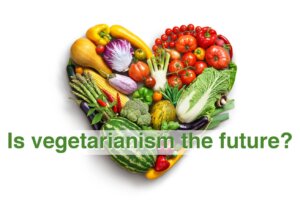Is vegetarianism the future? It is a very topical question. In the article you will find answers to many issues related to the vegetarian diet. Being veggie has become one of the hot food trends and part of the lifestyle of many people – it is also visible both in the home menu and in restaurants. This is not surprising – vegetarians appreciate their well-being, slender figure, as well as discovering new culinary horizons. Does this mean that within a few years we will all strive to limit or even completely exclude meat from our diet?
Does vegetarianism have a chance to „take over”
the world of nutrition?
Modern trend, ancient foundations
The history of this diet is most likely as old as humanity. The beginnings of this way of eating have their beginnings yet in the second millennium BC in ancient India, and independently also in the Mediterranean area. Just like now, so in the past people decided to avoid meat not only out of preferential causes, but also for ethical, religious or cultural reasons.
Vegetarianism means more than just changing your diet – it’s a certain philosophy and lifestyle. We are talking primarily about high nutritional awareness, which affects other human realms. In practice, this is very often connected with: detailed reading of labels, choosing the most natural products and physical activity.
Weggie has more than one name
„Vegetarianism is defined in many ways. Its essence can be defined as a way of eating consisting in excluding meat, fish, seafood and all or only some products of animal origin from the diet. When resigning from this type of articles, the basis of the menu should be: cereal products, preferably whole grains, vegetables, fruits, legume seeds, vegetable fats, as well as nuts.” – explains Katarzyna Zadka, an expert of the Winiary educational program: „Live toothsomely and healthfooly”.

Katarzyna Zadka, nutrition specialist of the educational program „Żyj smacznie i zdrowo” (transl. “Live toothsomely and healthfooly”)
There are many varieties of vegetarianism. They are conditioned by the degree of acceptance of animal origin products in the menu. We often hear about veganism, which allows you to eat only foods of plant origin – so, for example, dairy products, eggs, honey do not appear in such a menu. Other types of vegetarianism include: ovo-vegetarianism, lacto-vegetarianism, lacto-ovo-vegetarianism, semi-vegetarianism, raw foodism, fruitarianism. What do the different varieties of vegetarianism mean?
- ovo-vegetarianism – among products of animal origin it allows only eggs;
- lacto-vegetarianism – in addition to plant products, it permits the consumption of milk and dairy products;
- lacto-ovo-vegetarianism – provides for milk, dairy products and eggs are part of the diet;
- semi-vegetarianism – a variety that excludes only red meat. However, not everyone counts it as vegetarianism, because it undermines the basic assumption – not eating meat.
- raw foodism – allows the consumption of non-industrially processed products and rejects heat-treated dishes (e.g. cooking, baking, frying, barbecuing);
- fruitarianism – provides in the diet only fruits and vegetables, the acquisition of which will not cause the death of any plant, for example: fruitarians do not eat carrots or lettuce.
The position of the Ministry of Health (behind the Institute of Food and Nutrition) from 2013 on the issue of vegetarian nutrition is as follows: vegetarianism practiced in the right way is healthy at all stages of life. “This therefore confirms the full safety of a vegetarian diet, as long as it is diverse and well balanced. Exactly the same conditions must be met by the traditional way of eating to be able to consider it beneficial for our health. In a vegetarian diet, due to the exclusion of certain groups of products, you need to remember to provide the body with the right amount of protein, calcium, iron and vitamin B12, coming from other sources.
The sensible introduction of this type of eating habits should be remembered especially by young people who are still in the process of growth. Ideally, such modifications should be consulted with a nutritionist or at least parents” – comments Katarzyna Zadka, an expert of the Winiary educational program “Live toothsomely and healthfooly”.
Vegetarians in numbers
According to research conducted by the Homo Homini Institute for Public Opinion Research (September 2013), already 3.2% of Poles, i.e. about 1 million of the population, use the vegetarian diet1. This is a trend that is definitely gaining popularity! The survey showed that as many as 3.7% of respondents described themselves as “aspiring to be vegetarians” due to the occasional consumption of fish and meat. This is confirmed by the fact that vegetarianism can certainly be described as the diet of “tomorrow”.
Copywrite
This article is open source, it is available under Creative Commons Attribution License (the authorship recognition), which allows unlimited use, distribution and reproduction on any media, provided the original work is properly cited with an active link: https://eco-supplements.com/health-and-beauty/is-vegetarianism-the-future/ – license content: http://creativecommons.org/licenses/by/3.0/.
Translations
| The article "Is vegetarianism the future?" in other languages | |
|---|---|
| Czy wegetarianizm to przyszłość? po Polsku: Czy wegetarianizm to przyszłość? |  |
| Ist Vegetarismus die Zukunft? Deutsch: Ist Vegetarismus die Zukunft? |  |











